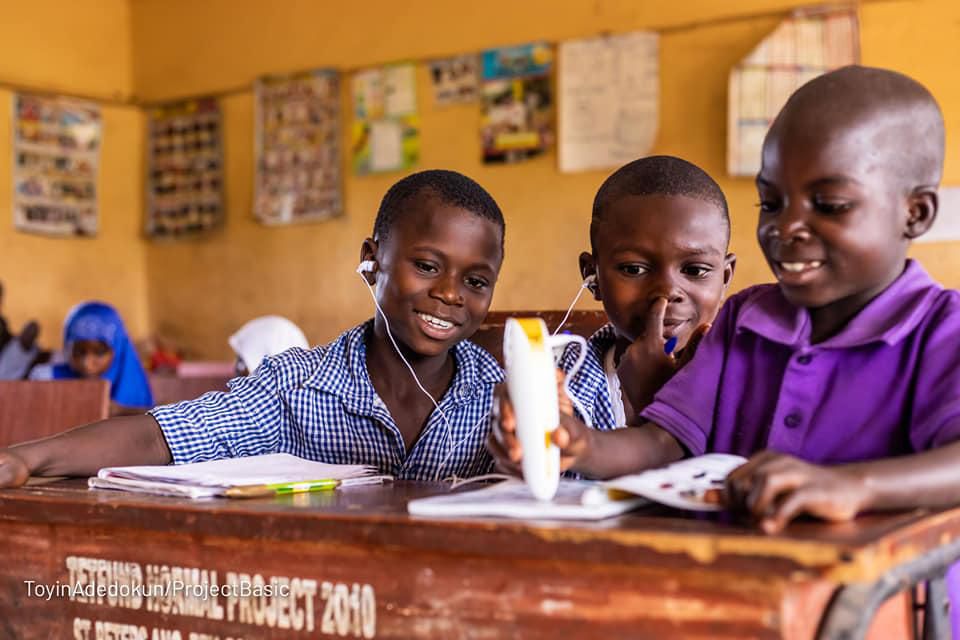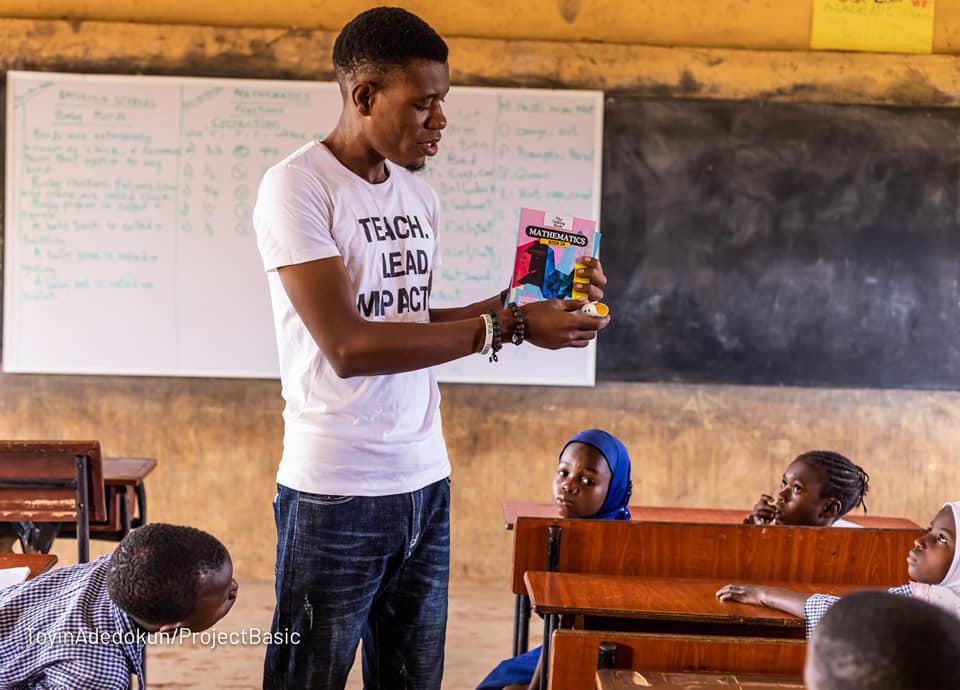How a young Nigerian is tackling learning problem among rural pupils with digital tools
)
In April 2022, the United Nations Children’s Fund (UNICEF), at a two-day Media Dialogue on Sustainable Development Goals (SDGs), stated that 70 per cent of schoolchildren in Nigeria are not benefitting from quality education.
This statistics captures the reality of the pupils of St. Peter’s Anglican Primary School, Joga Orile, in Ogun State, Nigeria.
Indeed, education is a fundamental human right, but the primary school pupils in Joga Orile, a rural and low-income community in the Yewa region of Ogun State, are ostensibly among the marginalised school children in Nigeria.
Despite being the only primary school in the rural community with some solid blocks of classrooms donated by a prominent indigene of the town, Dr. Abi A. Afonja, the school lacks basic facilities to aid teaching and learning.
The pupils’ lack of access to quality reading materials and teaching aids hamper their learning because many of them struggle to identify alphabet letters, numbers, and basic mathematics.
According to a World Bank report released in 2018, only about 20 per cent of Nigerian pupils who have completed primary education can read.
This report further highlights the issue at St. Peter's Anglican Primary School, and the situation is worsened by the fact that as much as their peasant parents want them to be educated, they are economically handicapped to give their wards the best of education.
But last year, the pupils were exposed to a new learning experience following the posting of Oladapo Omitogun to the school as a teaching fellow by a non-profit organisation, Teach For Nigeria.
Tackling the problem
Founded in 2016, Teach For Nigeria is a non-profit organisation focused on eliminating educational inequity in Nigeria.
As part of its efforts to provide a quality education that will give young Nigerians a successful future, the initiative recruited young graduates and education enthusiasts to teach in rural schools.

However, during the early days of his fellowship with Teach for Nigeria, Oladapo Omitogun volunteered for another non-profit organisation, Aid for Rural Education Access Initiative (AREAi) as a community liaison officer to take training on the awareness of digital innovative tools to enhance learning in and outside the classroom.
Due to limited resources, four schools (two primary and two secondary schools) were selected as beneficiaries of AREAi's initiative in Ogun State, and as a result of his participation in the initiative's training, Oladapo was able to get his school, St. Peter's Anglican Primary School registered for the programme.
Determined to leave the pupils better than he met them, Oladapo went further to procure some digital tools, seven talking books, and a pen from Mavis Computel Limited to aid his teaching efforts.
“If you have learners that are having difficulties in basic education, whether the alphabet or addition, the tools help them to learn with interactive audio technology”, Oladapo said.
These tools are specially designed to provide quality basic education to children and adult learners in Africa.
The talking books and pen do not just help pupils with basic education and language learning, the technology also makes learning exciting, engaging, and interactive.
According to Oladapo, the 28 pupils in his class who could not identify numbers and alphabet letters when he started teaching them in September 2021 have improved in their education because the interactive technology stimulates their interest in learning.
“What the tools do mostly is just to make your teaching easy. As a teacher, you have a lot of things to cover, and there are some learners that are not fast learners. The tools are solving part of the problem.
“There are also some learners that still want to learn by you writing on the board, and there are some that learn better through hearing, so the tools speak to them, and immediately they knew that the books can talk to them, They became more interested in learning.
“Oftentimes, they will come to ask me: Uncle, where’s that book now? Bring that book and stuff like that. Actually, if you look at learners today, they always want to play; they want to have fun and learn at the same time”.
In his bid to get the kids more familiar with the tools and further entrench their interest in learning, Oladapo organises afternoon tutorials for them and rewards those who wait after school hours for the tutorial with incentives like sweets and biscuits.
What has changed?
Since the introduction of the tools, primary three pupils who used to struggle with the alphabet and numbers can now identify them with gusto.
The pupils who could not communicate in English can now express their basic needs in English, write their names and solve basic mathematics.

Speaking about the perceived improvement in her child, Mrs Olabisi Obadina said that she had seen the impact of digital tools on her child.
“I have noticed a difference since uncle Dapo has been teaching them. My daughter told me about the talking book and pen their teacher introduced to them. I notice a difference in my child because she talks a lot about the talking books. God willing, if I have money, I will buy the book because I have seen its impact on my child.” Obadina said in Yoruba language.
Another parent who spoke in Yoruba, Mrs Fatimo Ojelabi, said her daughter can now greet in English and identify the alphabet letters.
She strongly believes Dapo did an excellent job improving her child’s learning with the aid of the talking books and pen.
Challenges
While success stories about the application of digital tools in classrooms abound, the stories could be more positive in marginalised communities like Joga Orile.
Apart from Oladapo, whose fellowship at the school ends in July 2023, no other school teachers at St. Peters Anglican Primary School applies digital tools to their teaching.
This implies that the end of his program at the school would most likely retard the progress in the pupils' learning unless another teacher takes up the initiative and gets the talking books and pen to aid their teaching.
Moreover, even if another teacher gets the digital tools, the books and the pen would not be enough to teach all the schoolchildren. Currently, only primary three pupils of the school are enjoying the initiative.
In an ideal setting, every pupil ought to have their personal talking books and pen, but parents of St. Peter's pupils may not be able to afford to buy the tools because they are expensive.
According to Oladapo, a pupil would need at least two books and a pen which cost about N40,000.
It is, therefore, imperative for state governments to collaborate with non-profit organisations like Teach for Nigeria and AREAi to expose kids in rural communities to digital learning and improve the quality of education at underserved schools.
*This story was done with the support of the Nigeria Health Watch and the Solutions Journalism Network as part of the Solutions Journalism Africa Initiative.
)
![Aisha blows hot on Security forces; Y7ou won't believe what she said [VIDEO]](https://image.api.sportal365.com/process/smp-images-production/pulse.ng/17082024/1f976edf-1ee2-4644-8ba1-7b52359e1a8f?operations=autocrop(640:427))
)
)
)
![Lagos state Governor, Babajide Sanwo-Olu visited the Infectious Disease Hospital in Yaba where the Coronavirus index patient is being managed. [Twitter/@jidesanwoolu]](https://image.api.sportal365.com/process/smp-images-production/pulse.ng/16082024/377b73a6-190e-4c77-b687-ca4cb1ee7489?operations=autocrop(236:157))
)
)
)
)
)
)
)
)
)
)
)